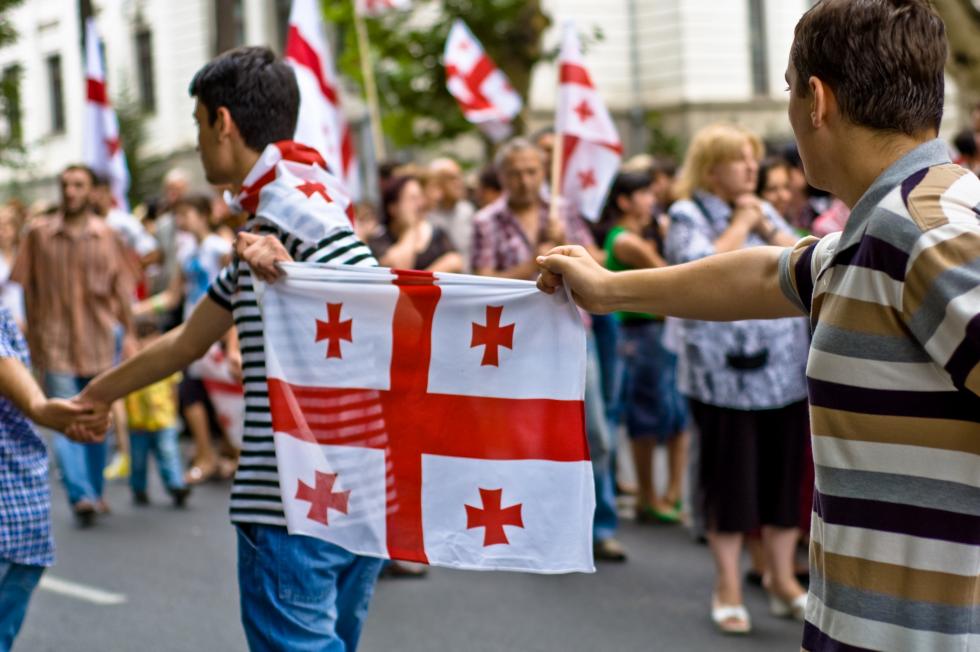The street protests that have started in Tbilisi on June 20, 2019, became a direct result of the mistakes of Georgian officials and a brazen behavior of a Russian politician. The former decided to hold the Orthodox Parliamentary Assembly meeting at the main hall of the Georgian Parliament, whereas the latter to get into the chair of the speaker and address the meeting in Russian. Something everybody would simply neglect if not for the 20% of the Georgian territory that is occupied, and for Crimea, which was annexed by Russian Federation.
This was a last stone thrown towards the Georgian society. People, mostly young, tired of unfulfilled promises, with no future and lost relatives, decided to show their objection to the Russian aggression and the Georgian very inefficient government.
The protests were also fuelled by excessive use of force by the police, severly hurting two young people and leading to more than 200 being hospitalized, including journalists injured with rubber bullets. Another 300 were arrested.
The manifestations then demanded resignation of the parliament speaker, the minister of interior, and adopting the proportional (or party list) system of parliamentary elections.
Two of these demands the Georgian government satisfied quite quickly, but the minister still holds his position, which has been justified by the need to conduct an investigation. The protesters stressed they will continue until his resignation.
To add some context, it is crucial to understand that the Georgian Dream party (before the coalition) came to power in 2012 with many illusionary promises, most of which have never been fulfilled.
One of the political promises was to warm up the relations with Russian Federation, which was very severely criticized by the public and the opposition, who perceived it as this a possible trap, not to mention a rather impossible task.
The government, however, continued its efforts and engaged in trade and economic relations with Russia.
Recently, the trade and tourism sectors as regards cooperation with Russia had observed positive trends, despite numerous violations of international agreements by the Russian side and an absence of official and diplomatic relations.
At the same time, the role of Europe has diminished in this respect, even though Georgia has Association and (Deep and Comprehensive) Free Trade Agreements with the EU.
With political and budgetary support Georgia has attracted Russian visitors and succeeded in increasing the wine exports to Russia, which allowed for Georgian wines to enter the stores again.
For instance, the government directly subsidized advertisements in Russian TV channels promoting tourism, leading to more than one million Russian visitors a year (Armenia with its less than 3 million inhabitants has approximately the same volume of tourism).
Soon, however, the number of flights between the countries reached 15 a day. But then, suddenly, the Russian authorities, in a very dictatorial way, prohibited flights and stopped organized tourism. It also prohibited some of the Georgian wine companies to sell their wines in Russia.
The rhetoric and the accusations made by the Russian authorities have become more and more aggressive with every passing day.
What is important is that the majority of Georgian people thinks that, first, Russia is dangerous and, second, we cannot be partners of Russia, and instead need more integration with Europe and NATO.
When some friends asked me why I was (or Georgia was) so upset with Russia when many Westerners decided to cooperate with it, I created a short formula, why I think we need to get rid of Russia and establish closer ties to the West instead.
First, Russia is a very unreliable partner, if it may even be called one at all. It may, indeed, sign a treaty, an international agreement, or join international institutions, but it would never fulfill any obligations. Georgia, unfortnately, has had a long history of such illusions and failures. That’s enough.
Second, Russia doesn’t recognize and respect individuals, their freedoms, and rights. There are hundreds of examples of such a behavior.
So, the choice is clear: Either do Georgian people get into a club that is dominated by such unacceptable behavior and aggressive ideology and face the consequences, or they join the European club.
Russia is doing its utmost to maintain strong influence in the former Soviet countries and beyond. This was also the main theme of the discussion during the conference organized by New Economic School – Georgia together with the University of Georgia, which had been held three days before the protests started.
The conference hosted Luke Coffey, Andreas Umland, Susanne Spahn, Michael Carpenter, Zygimantas Pavilionis, Krassen stanchev, Duncan Allan, Veronica Vichova, and other distinguished thinkers from the frontlines of resistance to the Russian hybrid and real warfare. One could even think the protests were, in fact, sparked by the voices and claims presented at the conference.



